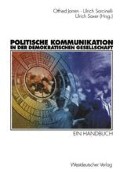Zusammenfassung
„Es gibt keine allgemein akzeptierte Definition für öffentliche Meinung.“ Mit diesem Satz eröffnete der langjährige Direktor der Journalistenschule der Columbia-Universität, New York, W. Phillips Davison, seinen Artikel über öffentliche Meinung in der 1968 erschienenen „International Encyclopedia of the Social Sciences“. „Dennoch“, fuhr er fort, „nimmt der Gebrauch dieses Begriffs immer mehr zu.“
Access this chapter
Tax calculation will be finalised at checkout
Purchases are for personal use only
Preview
Unable to display preview. Download preview PDF.
Literatur
Albrecht, Angelika (1983): Lachen und Lächeln — Isolation oder Integration? Magisterarbeit. Univ. Mainz
Aristoteles (1986): Politik. München.
Beniger, James R. (1992): The Impact of Polling on Public Opinion: Reconciling Foucault, Habermas, and Bourdieu. In: International Journal of Public Opinion Research, 4. Jg., Nr. 3, S. 204–219.
Brosius, Hans-Bernd/Bathelt, Anke (1994): The Utility of Examples in Persuasive Communications. In: Communication Research, 21. Jg., S. 48–78.
Burke, Edmund (1975): An Appeal from the New to the Old Whigs. In: Burke, Edmund: The Works, Bd. III/IV. Neudruck der Ausgabe von 1887. Hildesheim, New York, S. 61–215.
Childs, Harwood L. (1965): Public Opinion: Nature, Formation, and Role. Princeton.
Cicero, Marcus Tullius (1980): Atticus-Briefe. Lat. u. dt. München, Zürich.
Dautrich, Kenneth/Dineen, Jennifer Necci (1996): Media Bias: What Journalists and the Public Say About It. In: The Public Perspective, 7. Jg., Nr. 6, S. 7–14.
The „Delibarative Opinion Poll“ Comes to Texas — and to Campaign ‘86. In: The Public Perspective, 7. Jg., Nr. 1, December/January 1996, S. 1–20; 41–49.
Erasmus von Rotterdam (1968): Fürstenerziehung. Institutio Principis Christiani. Die Erziehung eines christlichen Fürsten. Einführung. Paderborn.
Glanvill, Joseph (1661): The Vanity of Dogmatizing: or Confidence in Opinions. Manifested in a Discourse of the Shortness and Uncertainty of our Knowledge. And its Causes: with some Reflexions on Peripateticism, and An Apology for Philosophy. London.
Hennis, Wilhelm (1957): Meinungsforschung und repräsentative Demokratie. Zur Kritik politischer Umfragen. Tübingen.
Hobbes, Thomas (1969): The Elements of Law. Natural and Politic. London (zuerst 1650 ).
Hume, David (1978): Ein Traktat über die menschliche Natur. Hamburg.
Katz, Cheryl/Baldassare, Mark (1994): Popularity in an Freefall: Measuring a Spiral of Silence at the End of the Bush Presidency. In: International Journal of Public Opinion Research, 6. Jg., Nr. 1, S. 1–12.
Kaube, Jürgen (1996): Sieg über die Macht des Geheimnisses. Die Geburt der öffentlichen Meinung aus der Druckerpresse. In: Frankfurter Allgemeine Zeitung, Nr. 271 vom 20. 11., S.N5.
Köcher, Renate (1996): Emotionen — ein Standortfaktor. Langsam, aber absehbar werden die Vorbehalte etwa gegen die Gentechnologie abgebaut. In: Frankfurter Allgemeine Zeitung, Nr. 164 vom 17. 7., S. 5
Ladd, Everett Carll (1993): The 1992 U.S. National Election. In: International Journal of Public Opinion Research, 5. Jg., Nr. 1, S. 1–21.
Locke, John (1894): An Essay Concerning Human Understanding. Oxford.
Machiavelli, Niccolo (1978): Der Fürst. Stuttgart.
Mahrenholz, Ernst Gottfried (1993): Medien und Macht — Wie sichern wir Pluralismus und Transparenz? In: Bertelsmann-Briefe, Heft 129, S. 4–9.
Mead, George Herbert (1926): The Objective Reality of Perspective. In: Proceedings of the 6th International Congress of Philosophy, S. 75–85.
Mead, George Herbert (1934): Mind, Self, and Society. From the Standpoint of a Social Behaviorist. Chicago.
Merton, Robert K. (1949): Social Theory and Social Structure. Toward the Codification of Theory and Research. New York.
Montaigne, Michel de (1902): Les Essais. Bordeaux.
Niedermann, Anne (1997): Ungeschriebene Gesetze: Ein sozialpsychologischer Ansatz zur Beschreibung des Spannungsfeldes zwischen öffentlicher Meinung und Recht. Berlin.
Niedermann, Bernd (1996): Öffentliche Meinung und Herrschaft in der Ära Richelieu. Zur Verflechtung von öffentlicher und veröffentlichter Meinung im Absolutismus. Diss. Univ. Mainz.
Platon (1578): Der Staat. 4. Buch. In: Platon: Sämtliche Werke, Bd. 2. Nachdruck Heidelberg o.J.
Rousseau, Jean-Jacques (1963): Der Gesellschaftsvertrag. Stuttgart.
Rusciano, Frank Louis/Fiske-Rusciano, Roberta (1990): Toward a Nation of,World Opinion’. In: International Journal of Public Opinion Research, 2. Jg., Nr. 4, S. 305–322.
Smend, Rudolf (1956): Integrationslehre. In: Handwörterbuch der Sozialwissenschaften, Bd. 5. Stuttgart u.a., S. 299–302.
Smith, Brewster M. (1970): Some Psychological Perspectives on the Theory of Public Opinion. In: Public Opinion Quarterly, 34. Jg., Nr. 3, S. 454–455.
Temple, Sir William (1964): An Essay Upon the Original and Nature of Government (= The Augustan Reprint Society, Publication Nr. 109). Los Angeles.
Thomasius, Christian (1986): Vom Laster der Zauberei. De crimine magion. Über die Hexenprozesse. München.
Tönnies, Ferdinand (1922): Kritik der öffentlichen Meinung. Berlin.
Verba, Sidney (1970): The Impact of the Public Policy. In: Public Opinion Quarterly, 34. Jg., Nr. 3, S. 455.
Wittkowski, Oliver (1996): Identität, öffentlicher Austausch und die Hierarchie der Isolation. Die Sozialpsychologie Erving Goffmans im Bezugsrahmen der Theorie der öffentlichen Meinung. Phil. Diss. Univ. Mainz.
Zaret, David (1996): Printing and the,Invention` of Public Opinion in the English Revolution. In: American Journal of Sociology, 101. Jg., Nr. 6, S. 1497–1555.
Editor information
Editors and Affiliations
Rights and permissions
Copyright information
© 1998 Westdeutscher Verlag GmbH, Opladen/Wiesbaden
About this chapter
Cite this chapter
Noelle-Neumann, E. (1998). Öffentliche Meinung. In: Jarren, O., Sarcinelli, U., Saxer, U. (eds) Politische Kommunikation in der demokratischen Gesellschaft. VS Verlag für Sozialwissenschaften. https://doi.org/10.1007/978-3-322-80348-1_4
Download citation
DOI: https://doi.org/10.1007/978-3-322-80348-1_4
Publisher Name: VS Verlag für Sozialwissenschaften
Print ISBN: 978-3-322-80349-8
Online ISBN: 978-3-322-80348-1
eBook Packages: Springer Book Archive

